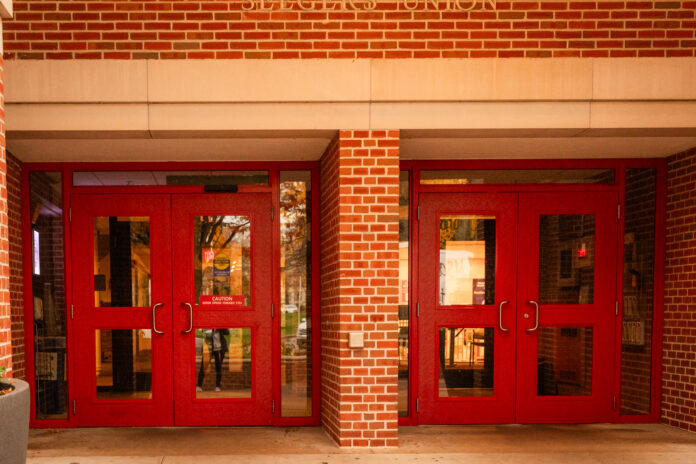I try to awaken every morning with the mindset that there is a new sun on the horizon. A new hope to be had, as the prospects of each day await my eager arrival. Today, the birds were chirping harmoniously with the garbage truck outside of my small window, a wonderful addition to my serene view of the dumpster. My alarm only rang five times– a new record– and I knew it was going to be a great day.
I stepped outside, took a deep breath of that fresh, Allentown air, and headed off to Seegers full of my usual gusto. I walked through Parents Plaza, around to the front entrance of the building, so that I could take in the beauty of the Academic Row foliage and tired, yet persistent students on my way. But as I went to enter the building, my positive feelings and high hopes were dashed by an aggressive flash of red in my face. To my complete and utter dismay, the student in front of me had not held the door open. And thus, my day had been completely ruined.
Maybe I’m being a tad dramatic. If you couldn’t tell, I tend to embellish. However, it is true that I was put off by this event for reasons that were unbeknownst to me at the time. Before I came to this school, I never really thought twice about whether or not the person in front of me held the door. It was always such a trivial gesture that would earn a “thank you” or a slight nod of approval when done, but would never cross my mind otherwise. But for some reason, I scoffed when I was met with a closed door this morning. Upon doing some reflecting, I’ve come to realize the importance of this perceived “bare minimum” action, and the way in which Muhlenberg embraces it as an unspoken policy.
It truly does make me feel like a part of a community in a surface-level way. Muhlenberg claims to, metaphorically speaking, encourage the opening of doors towards opportunities for its students and new connections with other Mules. For me, it is simply a matter of feeling valued by my fellow classmates. Each literal door-opener is a temporary friend, a new person to smile at down academic row, a face that has become slightly more familiar. I even use door-opening as an excuse to say hello to my friend crushes: people I know vaguely that I would like to learn more about on a personal level.
I’ve noticed that the general politeness of opening the door has translated to some of my other day-to-day practices as well. In terms of friendships, it has taught me that making the effort to go out of the way for someone does not go unnoticed, even if the gesture is not necessarily grand. I also find myself smiling at almost anyone I pass by, and having more confidence to compliment strangers. Selfishly, I feel rewarded by the influx of kindness I have been attempting to put out into the world lately, but I ultimately hope that it has a lasting effect on my classmates more so than anything else.
In my experience and through talking with other students, I have learned that the balance between your social and personal life in a campus setting can be challenging. I am a social person through and through, but I have unfortunately fallen victim to the Muhlenberg epidemic of taking on more activities and work than I should—and I am more tired than I would like to admit. My mother likes to say to me, “I pay for you to have a nice, big room. Why don’t you use it?” Something I need to get better at is being alone, yet not feeling left out or detached from the people around me. This issue seems to be a common phenomenon amongst college-aged students. On mornings when I feel the need to sleep in and go for a run as opposed to getting coffee with my friends, I find that I can at least rely on the social interactions that take place through these bare-minimum actions—such as holding the door and complimenting strangers—to tether me to the surrounding community. When I am instead met with a gust of wind from a door swinging closed, I feel shut out.
Although easy to lose sight of, my experience with the Seegers door that morning invited me to take into consideration that, in times of hardship, things that seem as insignificant as holding the door for someone have the power to make or break the rest of the day—they hold more significance than we can see on the surface. I implore us all to continue practicing this policy of holding the door open for the person behind us, both at Muhlenberg and outside of it.
Megan Hansen '26 is an opinion editor and writer studying film, theater, and writing. She is very excited to be working on the Weekly staff, helping to amplify the voices of her fellow classmates. You may also find her working behind the scenes with the Muhlenberg Theater Association, writing and directing short films, or even on a volleyball court in the fieldhouse on a random Tuesday night!
























Awesome article and so true. Such a simple gesture can go a long way
It’s so true. Such a simple gesture can go a long way